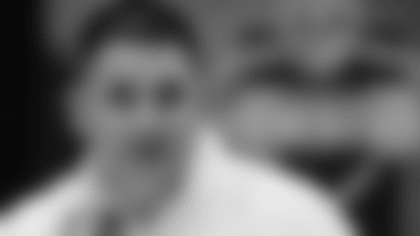INDIANAPOLIS – In a year when the NFL Combine became a primetime show, the Giants stuck to their traditional programming.
After more than a decade following essentially the same schedule, the league moved on-field drills from the time of day when most fans are working to the evening, when more of them watch television. Last week at the 2020 Combine, players were running, jumping, throwing and performing other position-specific drills from 4 to 11 p.m. Thursday through Saturday and 2 to 7 p.m. on Sunday.
As interest in the Combine continues to grow, the NFL made it easier for fans to watch the league's future stars on NFL Network, digital platforms or even in Lucas Oil Stadium – free of charge.
But even as the Combine has become a more public event, one of its more important rituals is still performed in protective privacy.
Each team is permitted to conduct up to 45 interviews with individual prospects. Over five days last week, the Giants welcomed a select group of offensive and defensive prospects to Suite LS 23A in the southeast corner of the stadium, out of sight from the prying eyes of the media, fans and the other 31 teams, who, of course, were speaking to many of the same players.
To many decision-makers, including Giants general manager Dave Gettleman, the football intelligence and personality traits exposed in each team's suite are arguably more important than the speed and strength numbers that are revealed on the field and in the weight room.
"I've said this before, I call it (the Combine) the underwear Olympics," Gettleman said during a break in the Giants' room. "At the end of the day, the biggest piece of this is probably the interview process, the psychological process, it's all that. That stuff and the medical.
"You're looking for how comfortable the player is. The coaches are asking football questions, so part of it is let's see how football smart the kid is, how much of an adjustment it's going to be for him. That's really what you're getting out of it. Their personality will come out because they're poked, they're prodded, and eventually the veneer comes off and they are who they are."
Coach Joe Judge also said the private interviews carry equal weight with the field work.
"I think it all ties together as a complete picture," Judge said. "You watch them on tape, there's no volume. The tape is the tape, and that's critical. From there, you get to go ahead and continue the evaluation by getting to meet them and talk with him. A lot of the guys are talking football, some guys are talking more character traits and personality. But you have to get a fit for them beyond just what the tape was."
Players entered the interview room knowing they could improve their standing with each team they met. What might not be as obvious was the extent to which they could hurt and even remove themselves from a draft board with a poor performance in the interview room.
"Guys can eliminate themselves because the character of the team is critical," Gettleman said. "If we think a guy doesn't fit based off of this thing, we'll really take a deep look at it."
Director of college scouting Chris Pettit attends a college game almost every weekend during the season, watches numerous practices and spends long hours studying tape. He arrives knowing who the best players are and doesn't hesitate when asked why the Combine is so valuable.
"We say it all the time, the best thing is the interviews," Pettit said. "You've seen them on tape, you've heard other people's opinions about them. You go to the school, you go on campus, you're talking to their coaches, their trainers, their academic people and you hear their opinions on the players. Then we create our opinion of them as players off the tape. Now, you get to meet them. Get to know their personality and just talk to them, whether it's in the private setting of the interview or we randomly run into them in the hallway here and you can talk, get to know them as people.
"You sit there and you're watching them, whether they're going over their X's and O's, their tape. But also just watching their body and mannerisms and how they interact with a coach. You can get a full evaluation of just that. I envision them with our players, how they would interact with our players, with our team, in our building, our staff. Can I see them this fall strapping it up for the Giants? You get a ton out of that. That's so important."

What's New This Year?
Moving the drills to a later time slot resulted in changes to both the number of players teams could interview at the Combine and where those sessions take place.
In previous years, each team got a room in the Crowne Plaza Hotel, which is attached to the Indiana Convention Center/stadium complex, and queried players there. But no one is leaving town after running sprints at 11 p.m. and those rooms are now needed for the players to sleep.
"You're not getting a flight out of Indianapolis after 8:30 at night," Gettleman said. "All those kids that are working out in the second and third groups of the day, they need to spend the night."
This year, teams were permitted to speak privately with no more than 45 players for up to 20 minutes each, a change from the 60-player, 15-minute parameters established in the past.
"The interviews were with a blend of players that we like a lot and we think we could take high in the draft as well as players we have specific questions about," said Pettit. "Unfortunately, we've been picking high the last three years (fourth this year and owning the second and sixth overall choices in the prior two drafts). So, it's a mix of players, some we may have concerns with, or maybe they're a small school guy that we don't have a lot of information on, underclassmen that we don't have a lot of information on. It's a blend of all those factors to get this list of who we're bringing in."
One of Gettleman's bedrock draft principles is to select the best available player and not one that necessarily fills a need. Pettit adhered to that philosophy when he chose which of the 337 players who attended the Combine the Giants would interview privately.
"When I make the list, I have our board in mind," Pettit said. "At this point of the year through our February meetings, you can kind of envision how our board is going to set up. A lot of time has been put into that and you kind of have to have the foresight, 'Okay, this guy is going to be here.' I have to project where certain guys are going to go in the draft, where we think we can get them. If there's a guy that is a spot in the draft where we might not have that pick, I have to be smart enough to say, 'Hey, let's not waste an interview on him.' But I put guys that I can see that we're going to have interest in as Giants and guys that we need answers on. That's kind of how I put it together. It takes time. It's a process that I'll start throughout the fall, I'll start keeping my list, say 'Hey, this guy is a potential guy I think we should have in our room.' Then as we go through two sets of meetings, we kind of define that even more. Then I'll sit with that list. I walked out of February meetings, I had 90 names that I was able to get to these 45."

The Room
Giants.com received permission to attend numerous interviews last week with the stipulation that neither the players' identities nor that of their colleges would be revealed.
For the interviews, Suite LS 23A was fittingly set up like a sports arena. The most important action occurred up front, where a window that normally provides a close view of the end zone was covered by a 65-inch television – which was shielded from the outside world by a black curtain hung outside the suite.
Just below the T.V. sat a small, low circular table with a chair on either side. Those seats were reserved for the prospect under interrogation and the corresponding position coach who diagrams plays, controls the video displayed on the screen and asks the potential future Giant numerous football and personal questions. Marc Colombo tested the offensive linemen, Tyke Tolbert the wide receivers, Jerome Henderson the defensive backs, etc.
A few feet back from the action were four oversized blue leather chairs, which were occupied, left to right when looking from the back of the room, by Pettit, Judge, one of the coordinators (Jason Garrett when an offensive player was in the hot seat, Patrick Graham when it was a defensive player), and Jessie Armstead, the former five-time Pro Bowl linebacker who is the special assistant to the general manager.
Just behind the chairs was a long, narrow table with four chairs, which were for Gettleman; Kevin Abrams, the vice president of football operations and assistant general manager; Tim McDonnell, the assistant director of player personnel; and Mark Koncz, the director of player personnel.
In the back of the room were several long-legged chairs filled by a rotating roster of scouts and coaches.
Said Pettit, "We tell our area scouts, 'If there's a specific question on these guys, feel free to chime in. But let's really let the position coach get in their head mentally with the X's and O's stuff.'"
On the left side of the room was a long cabinet covered with Giants winter hats – one of which is presented to each prospect – and an assortment of snacks from chips to beef jerky to several varieties of sweets.
Check out the best photos from behind the scenes at the NFL Combine.

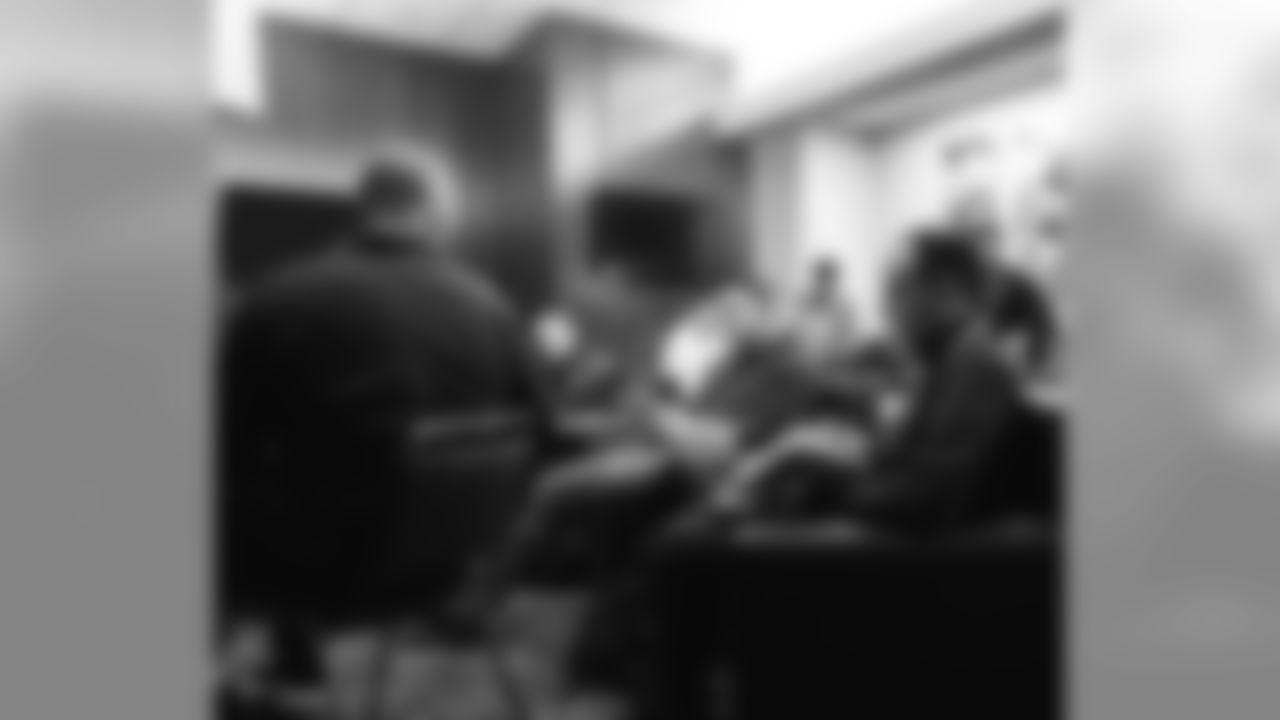



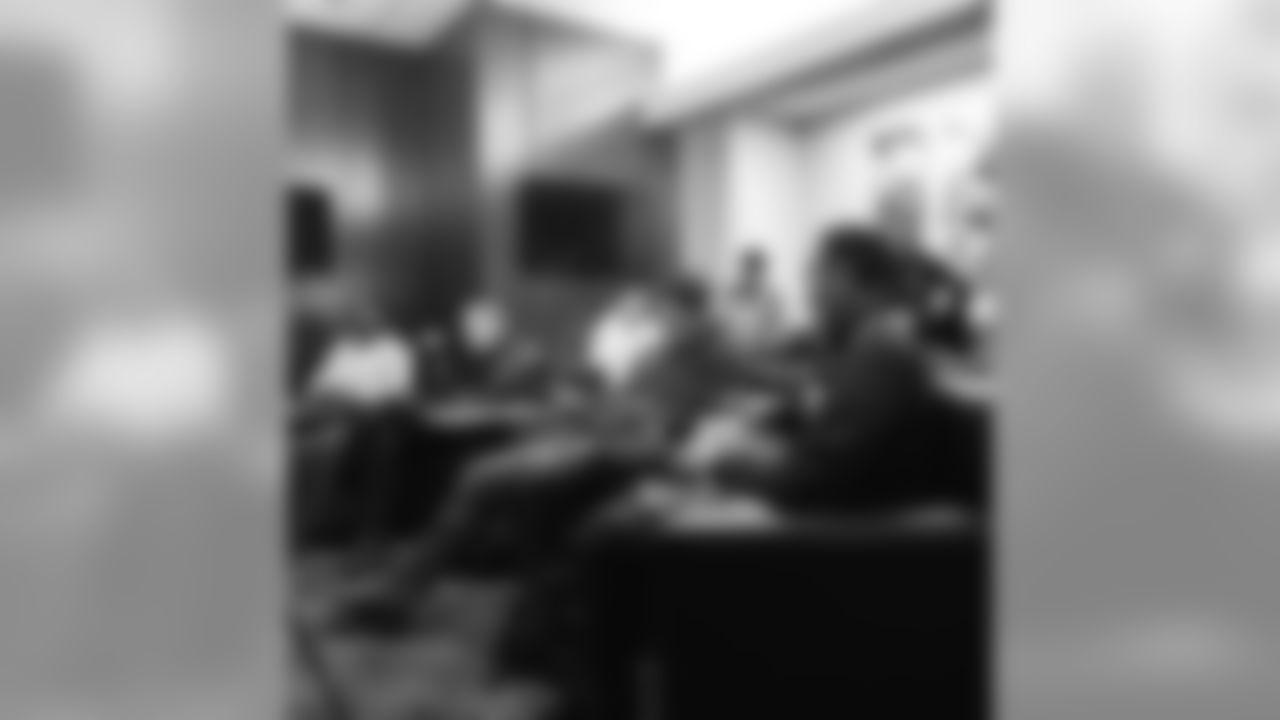
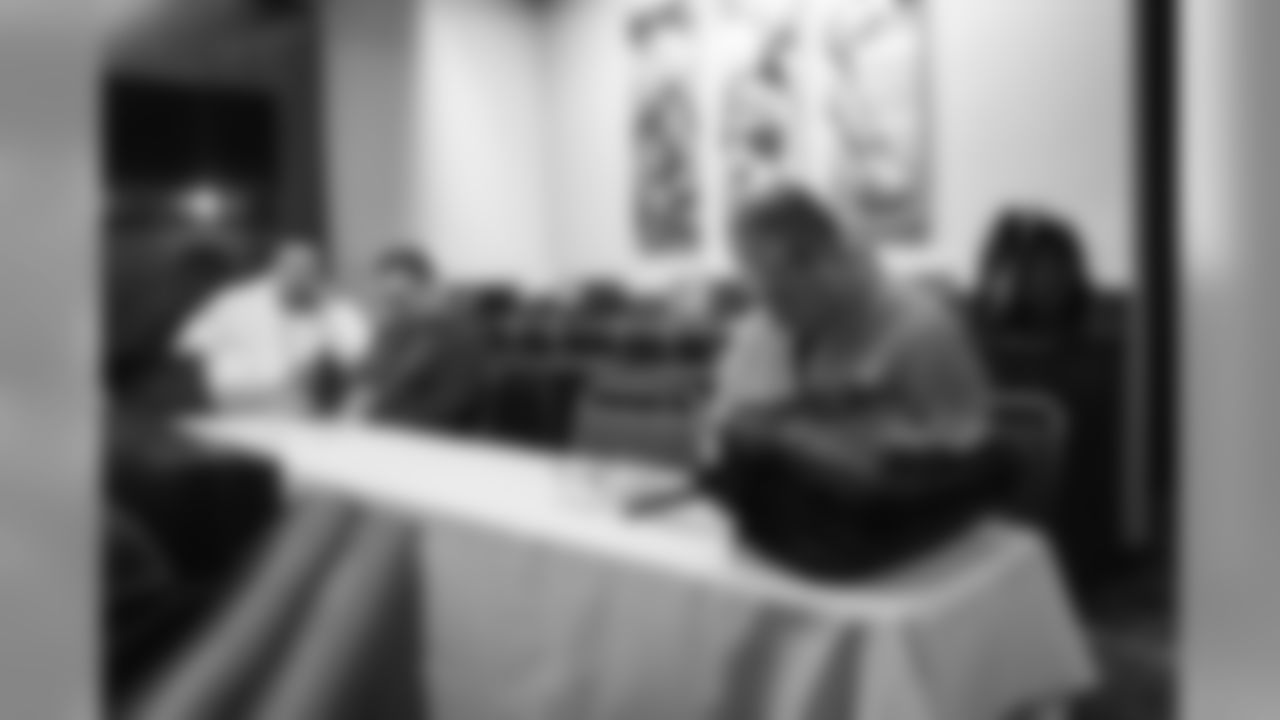




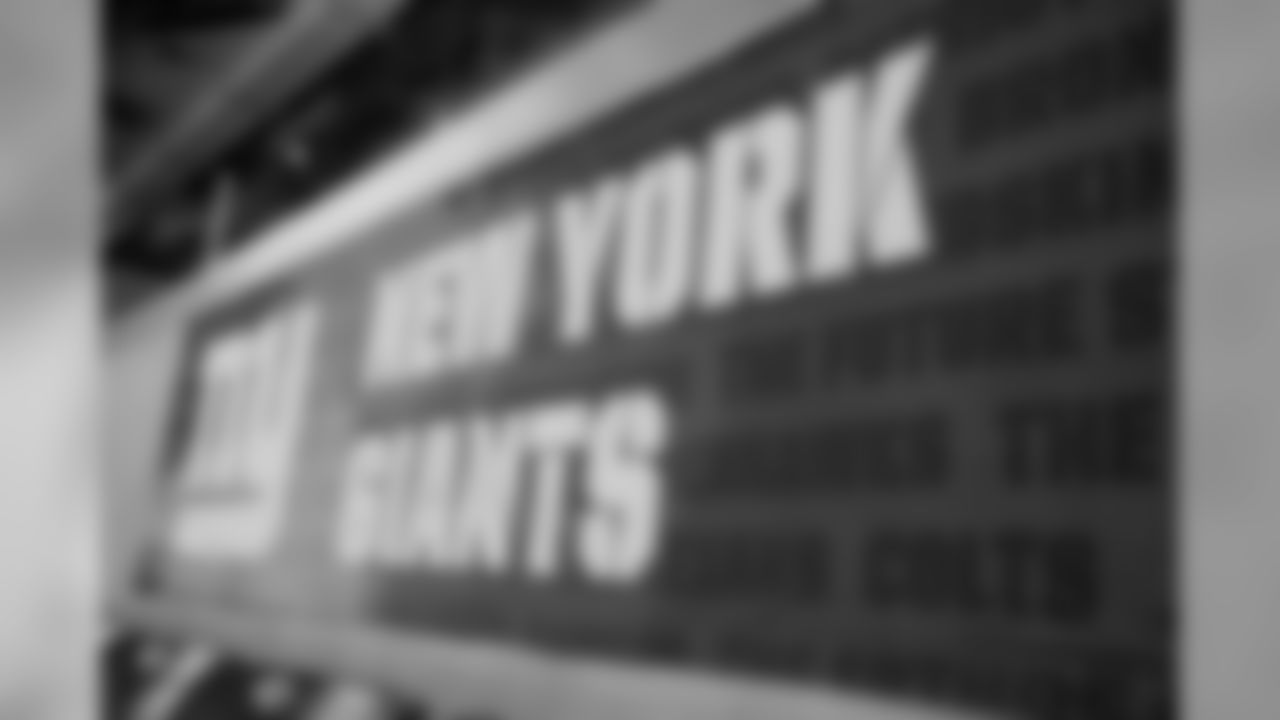
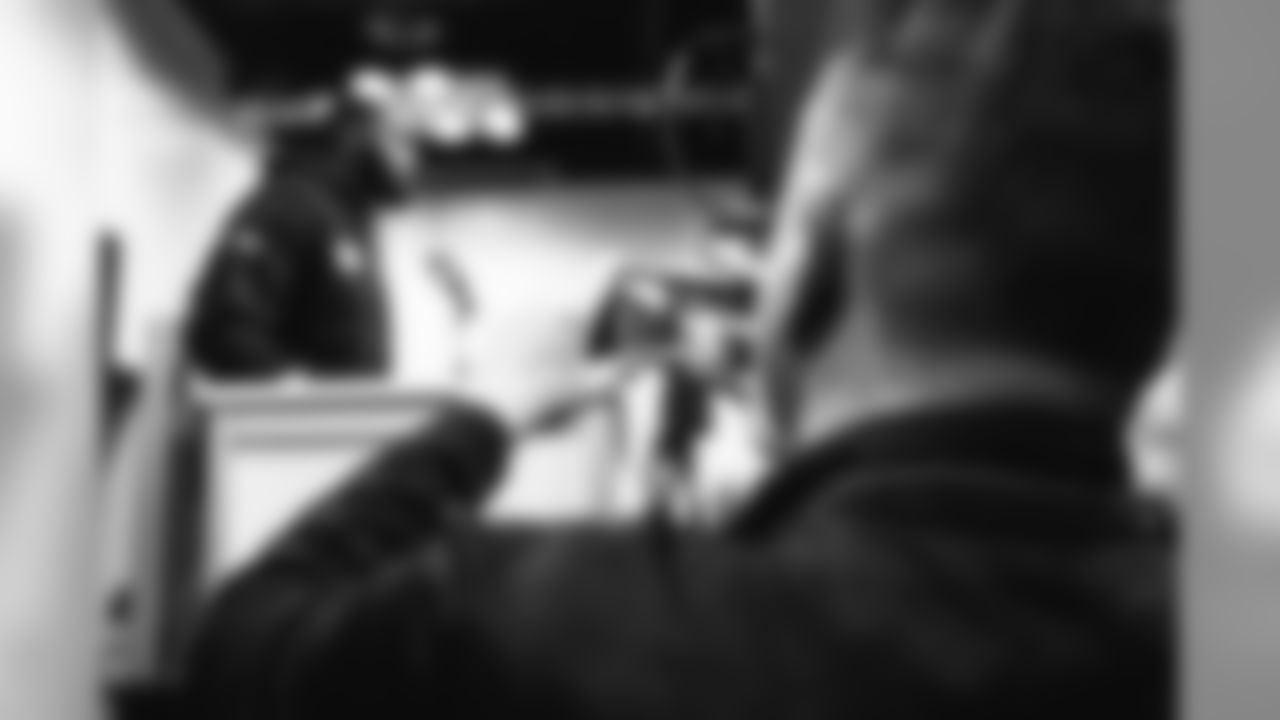

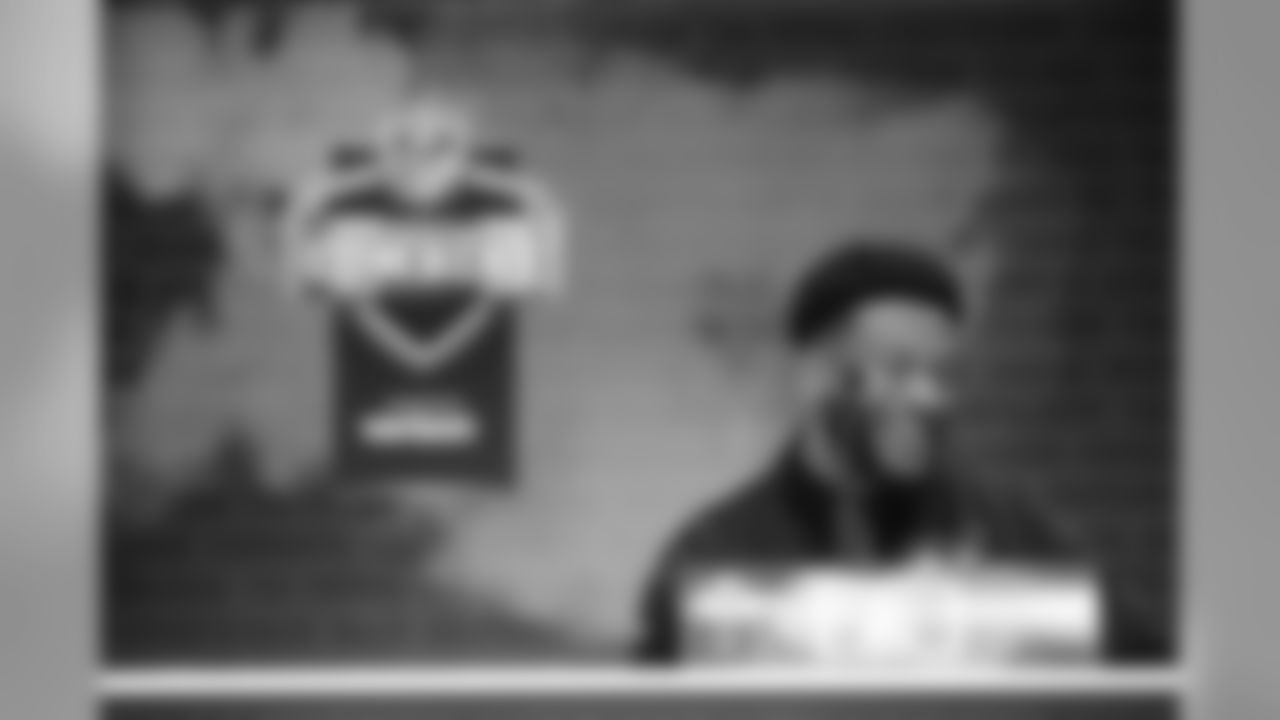
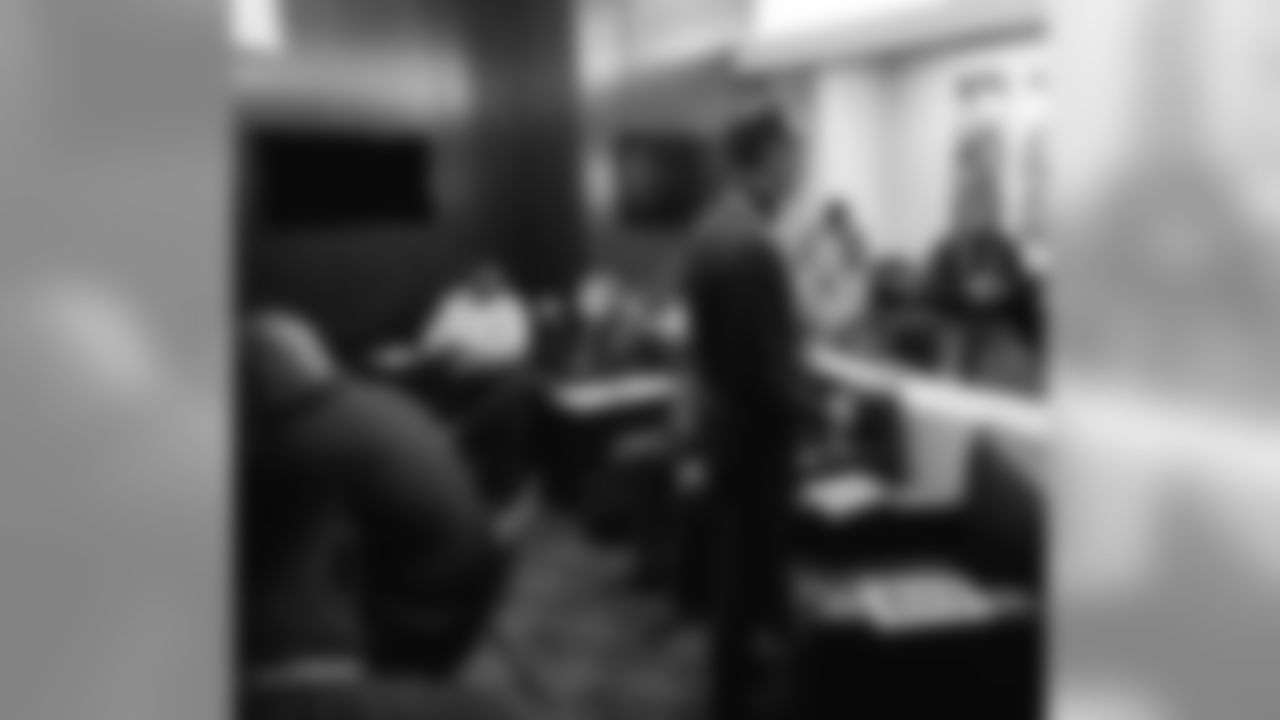

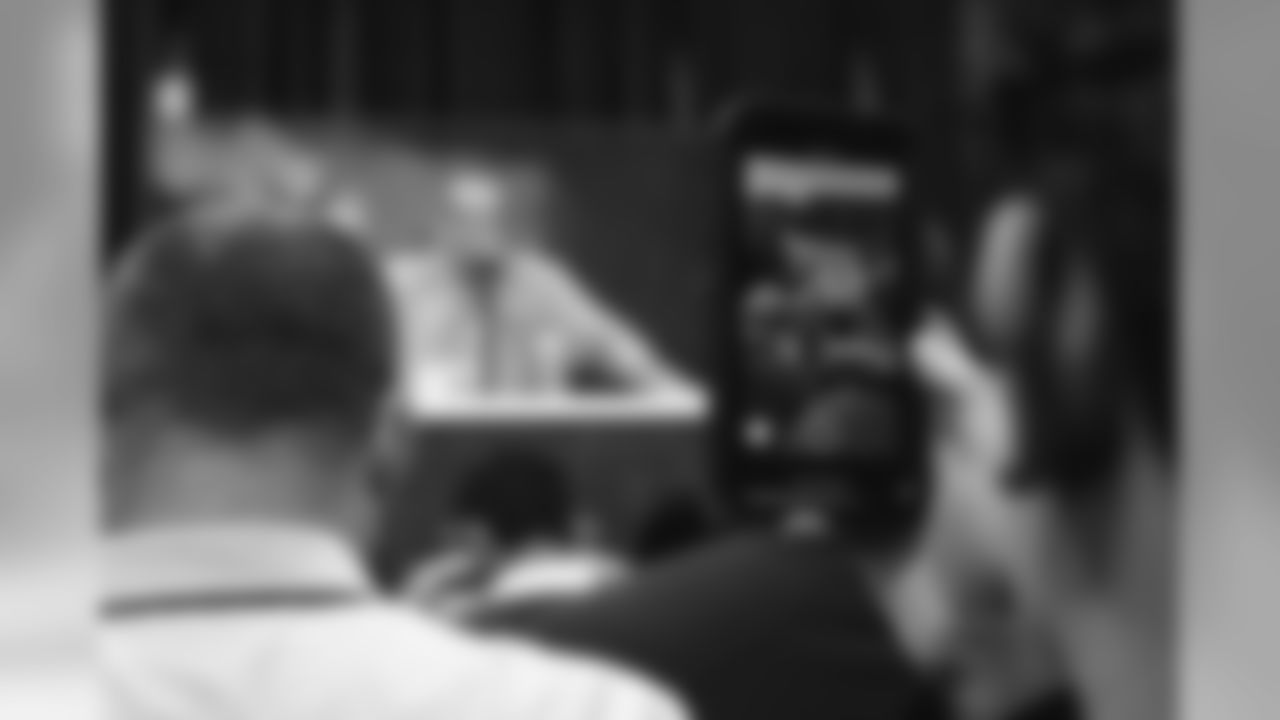

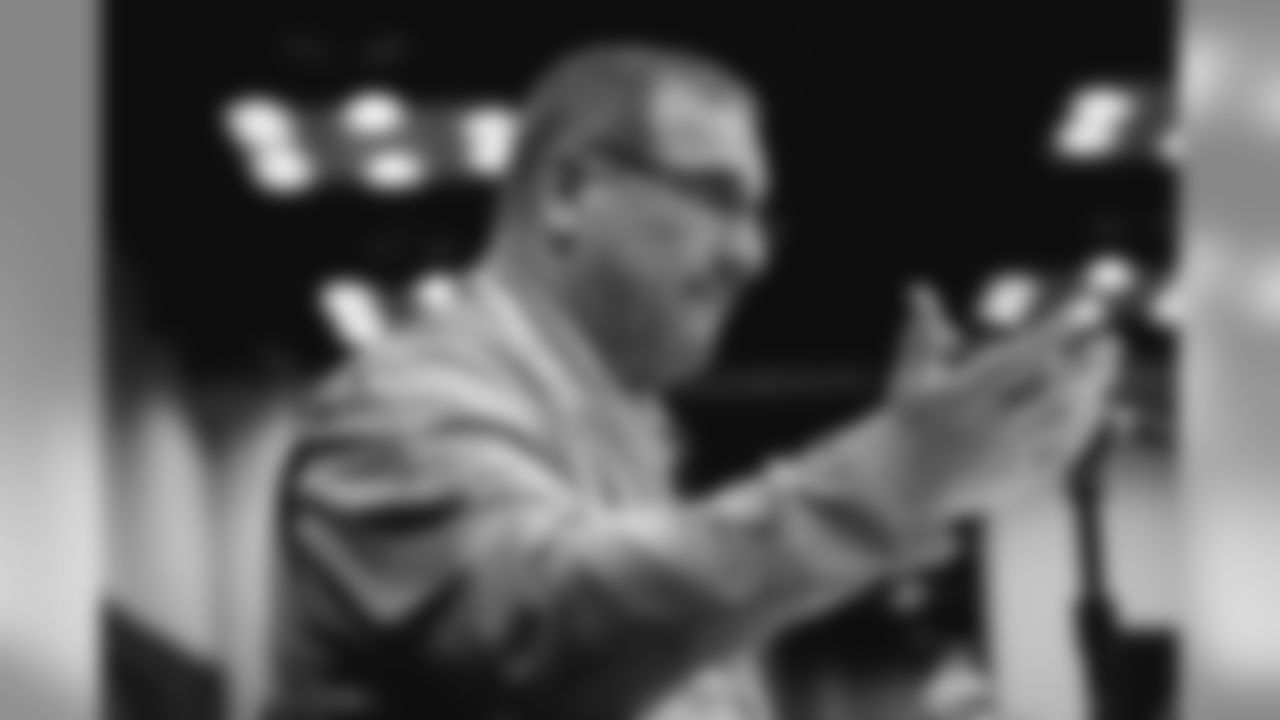
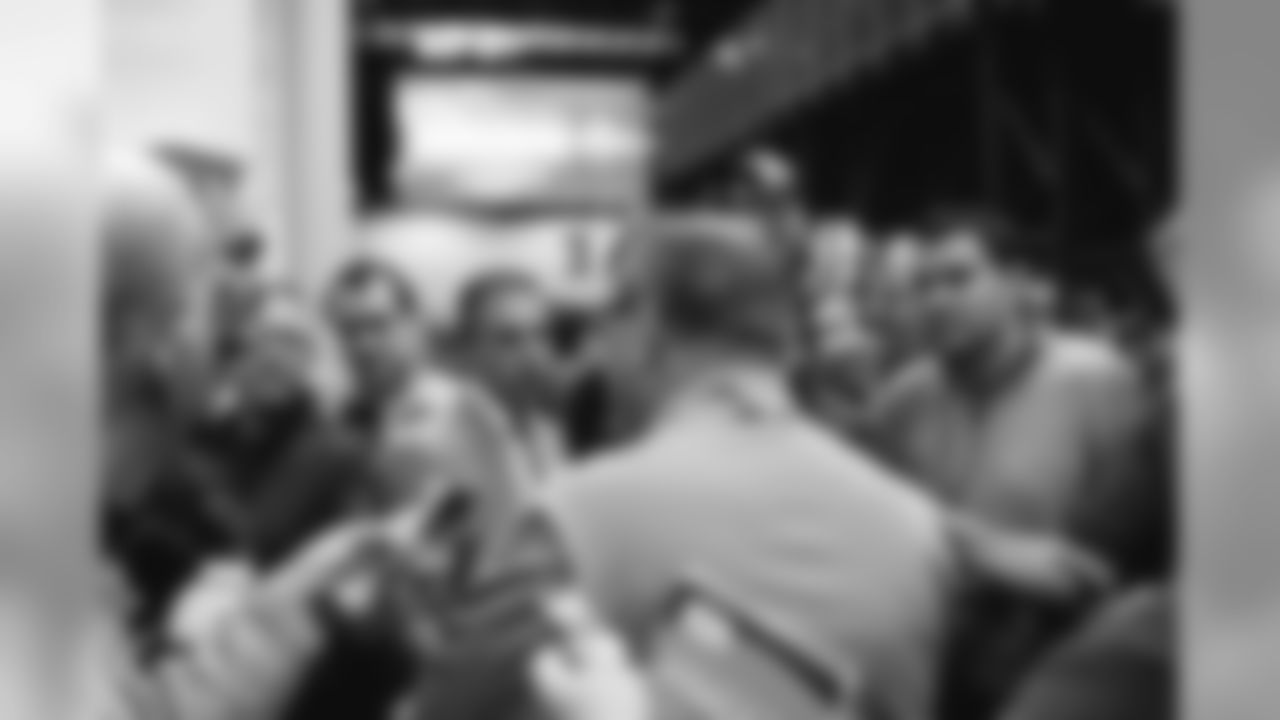
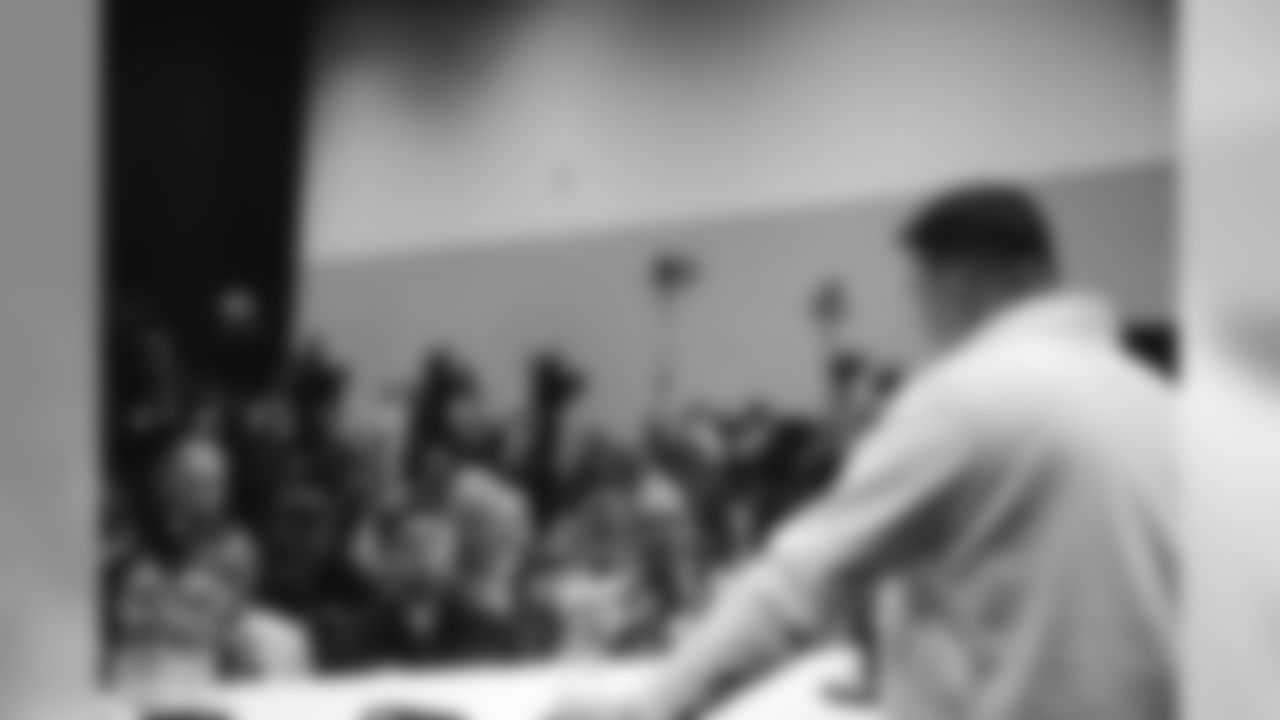
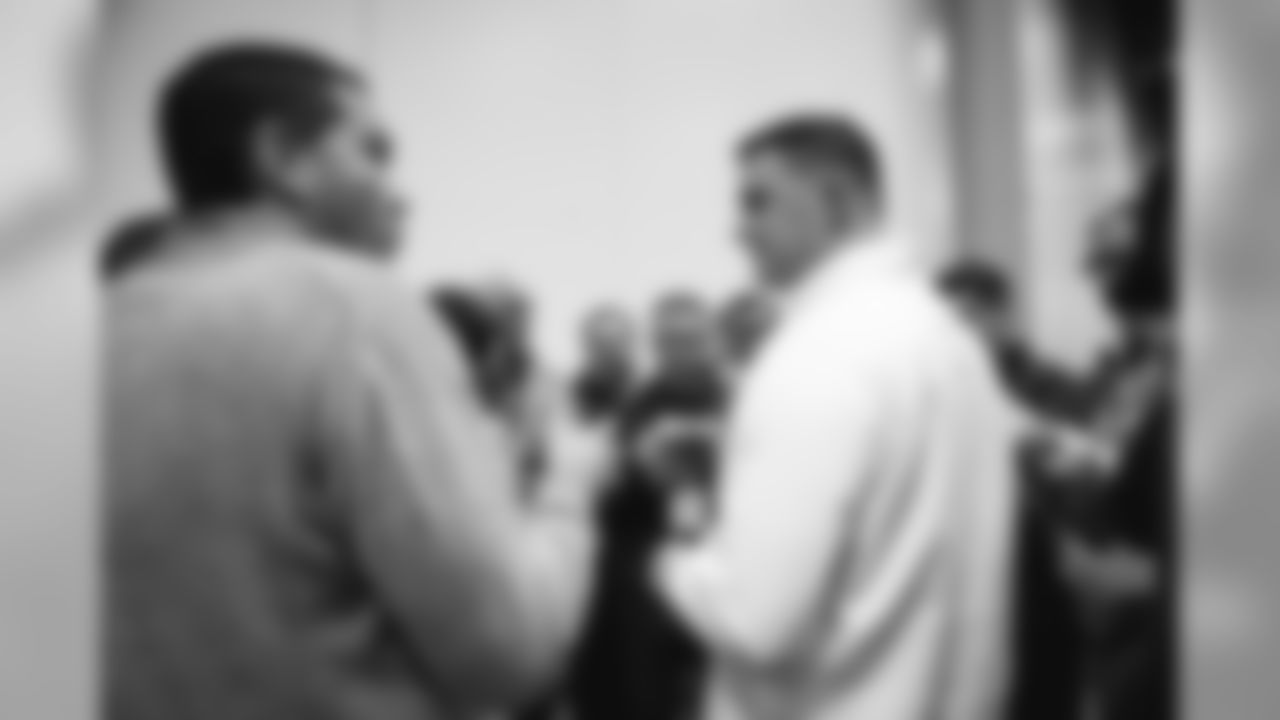



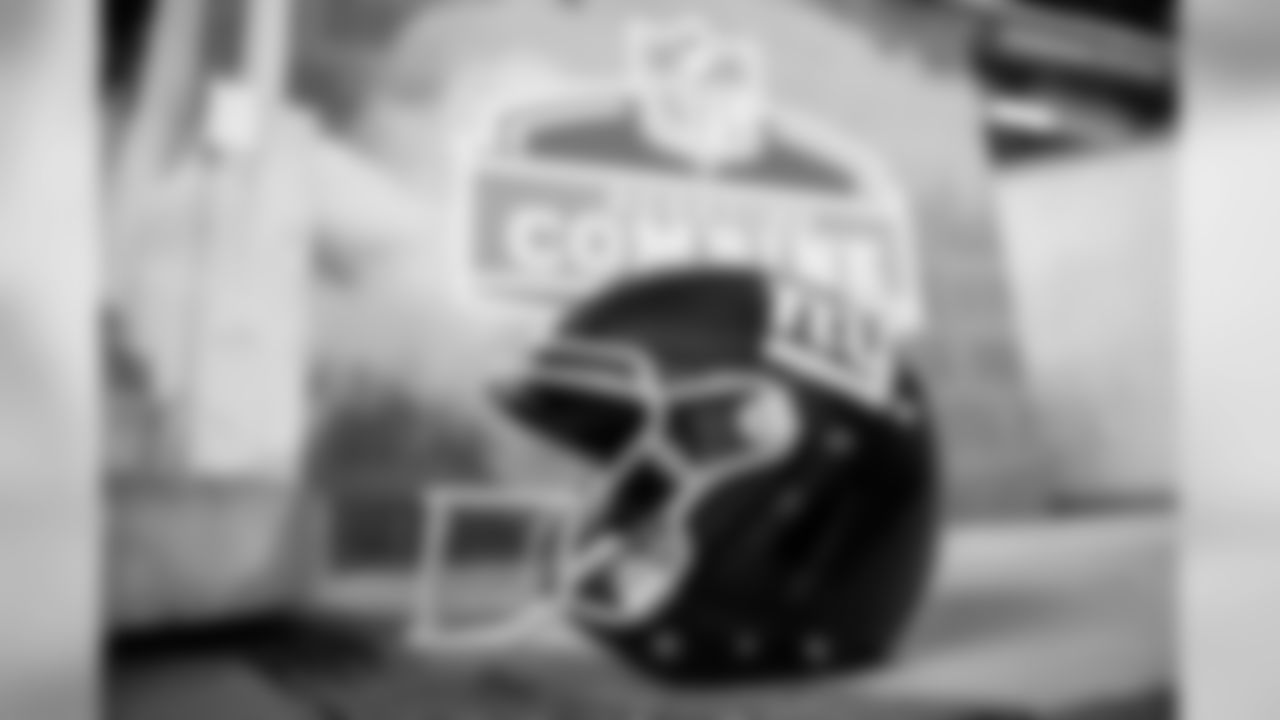
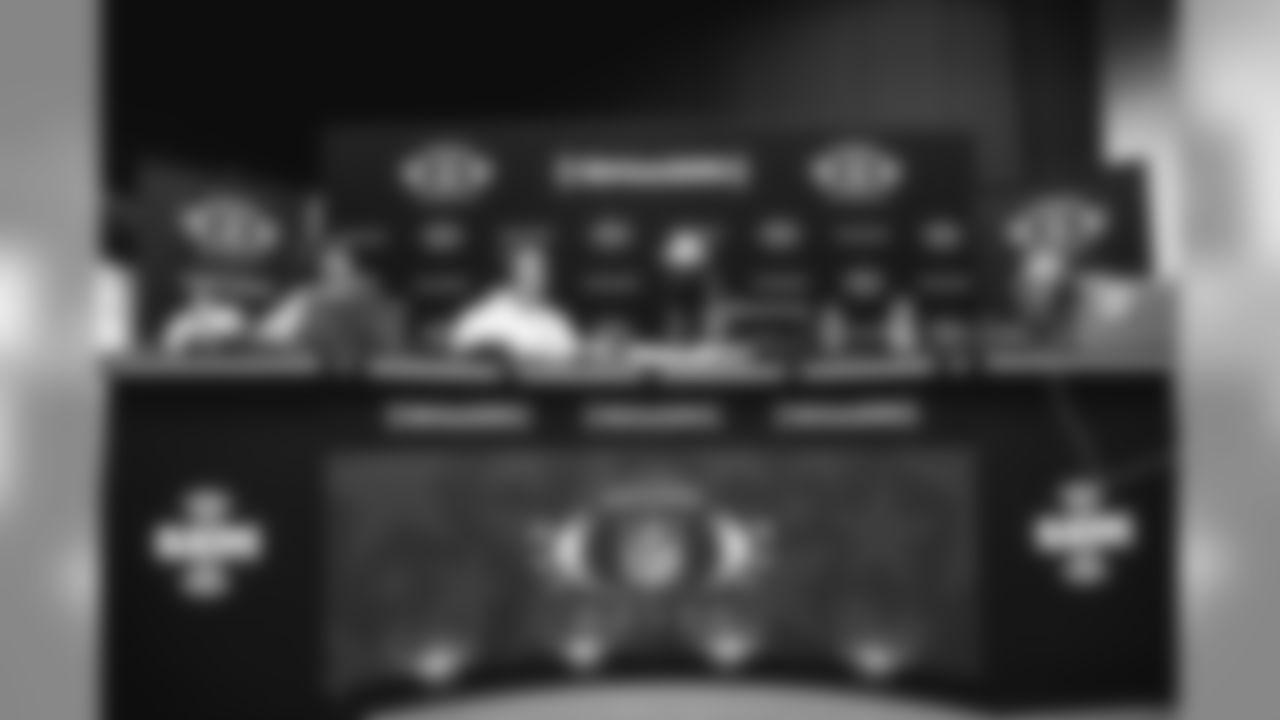
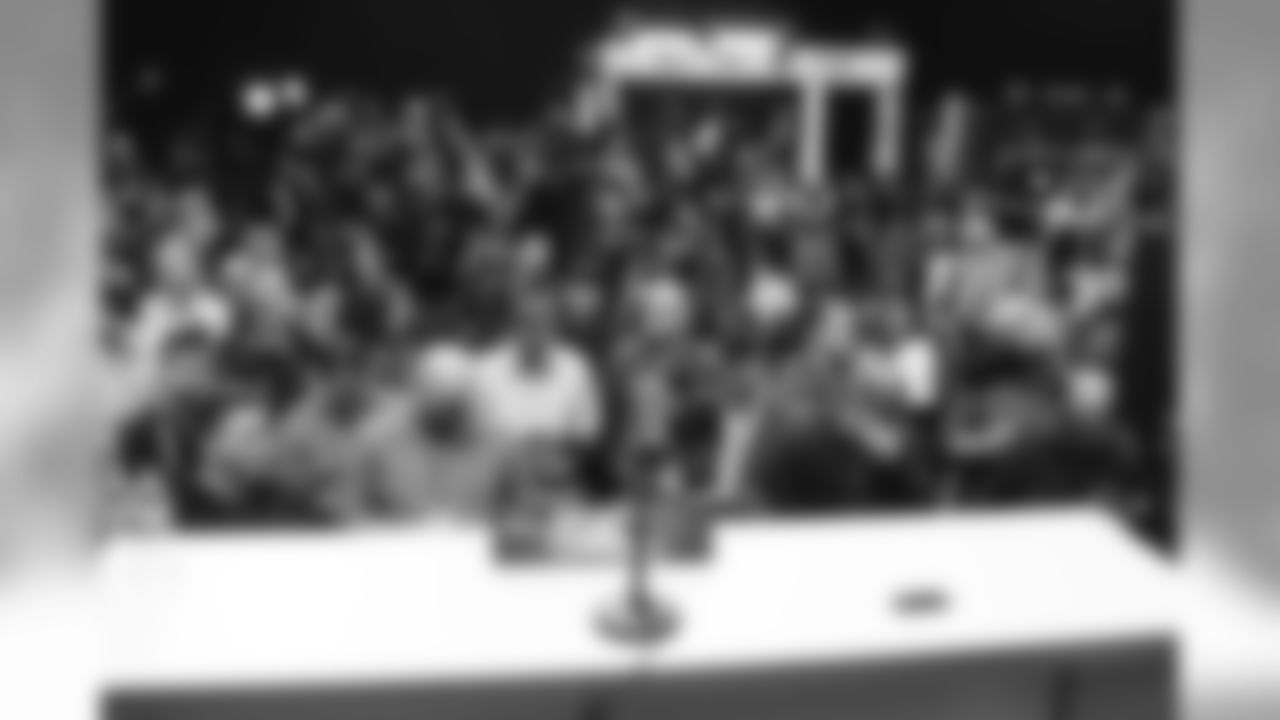


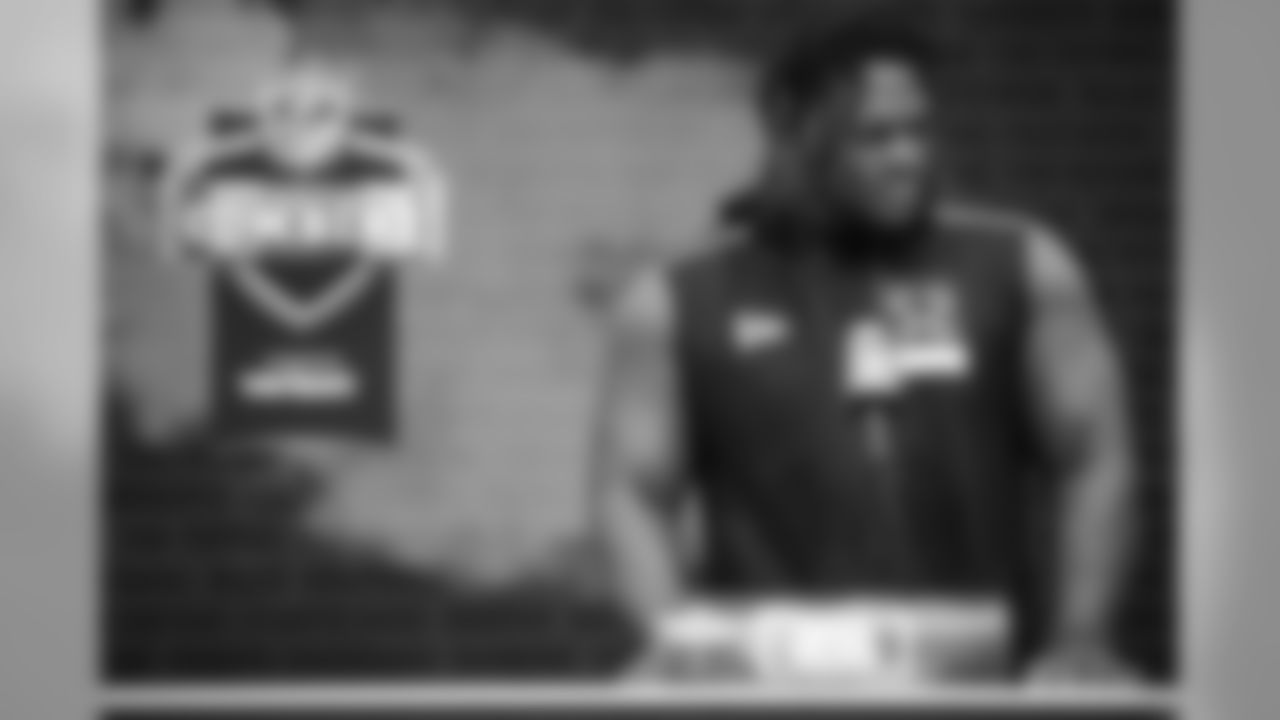
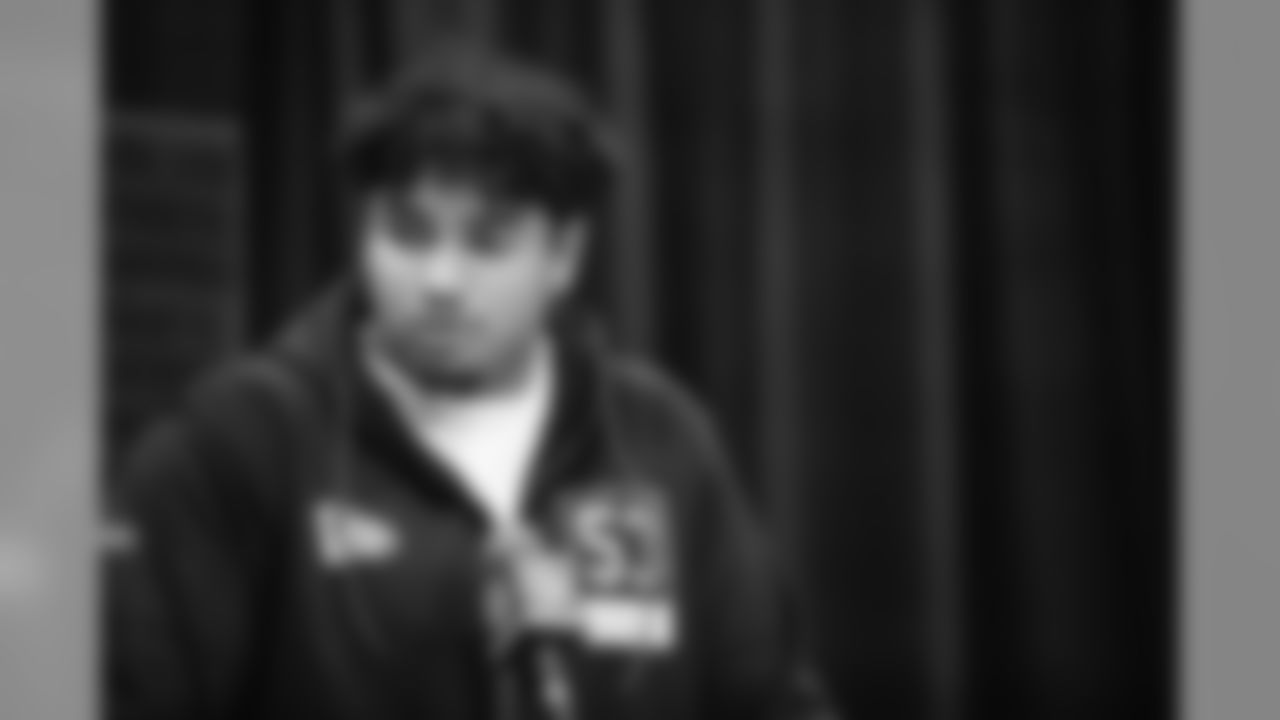
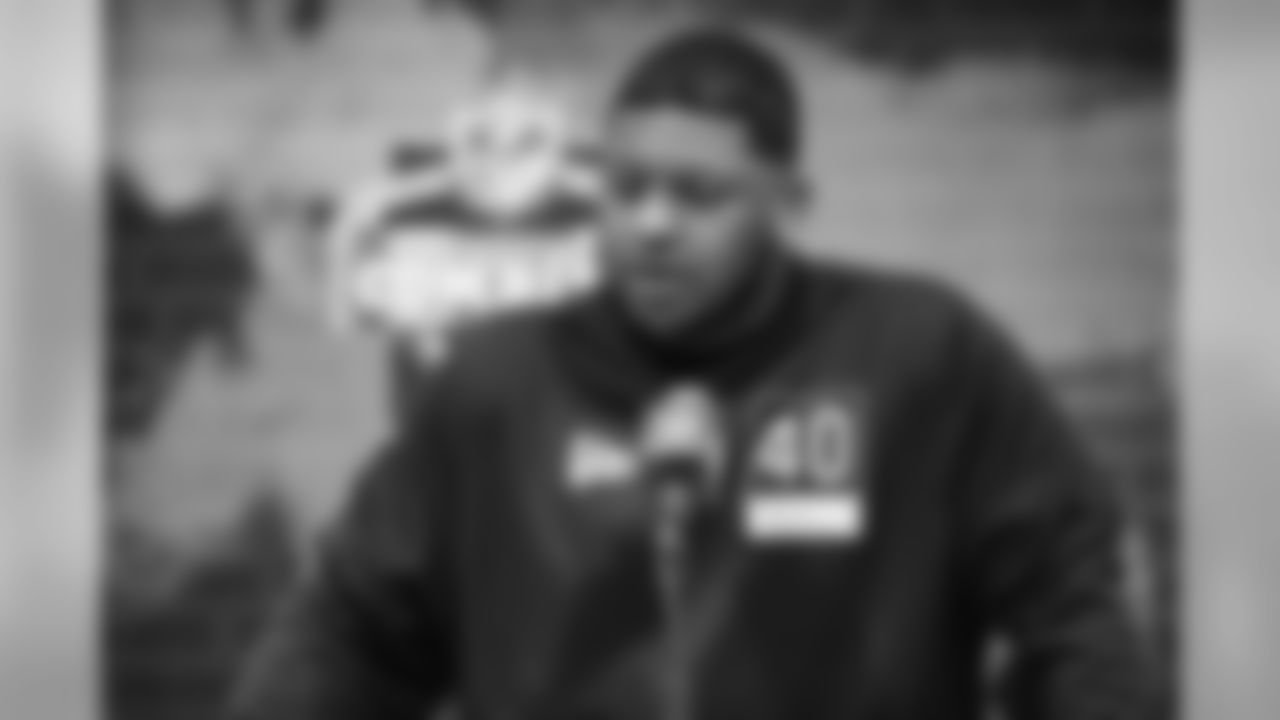
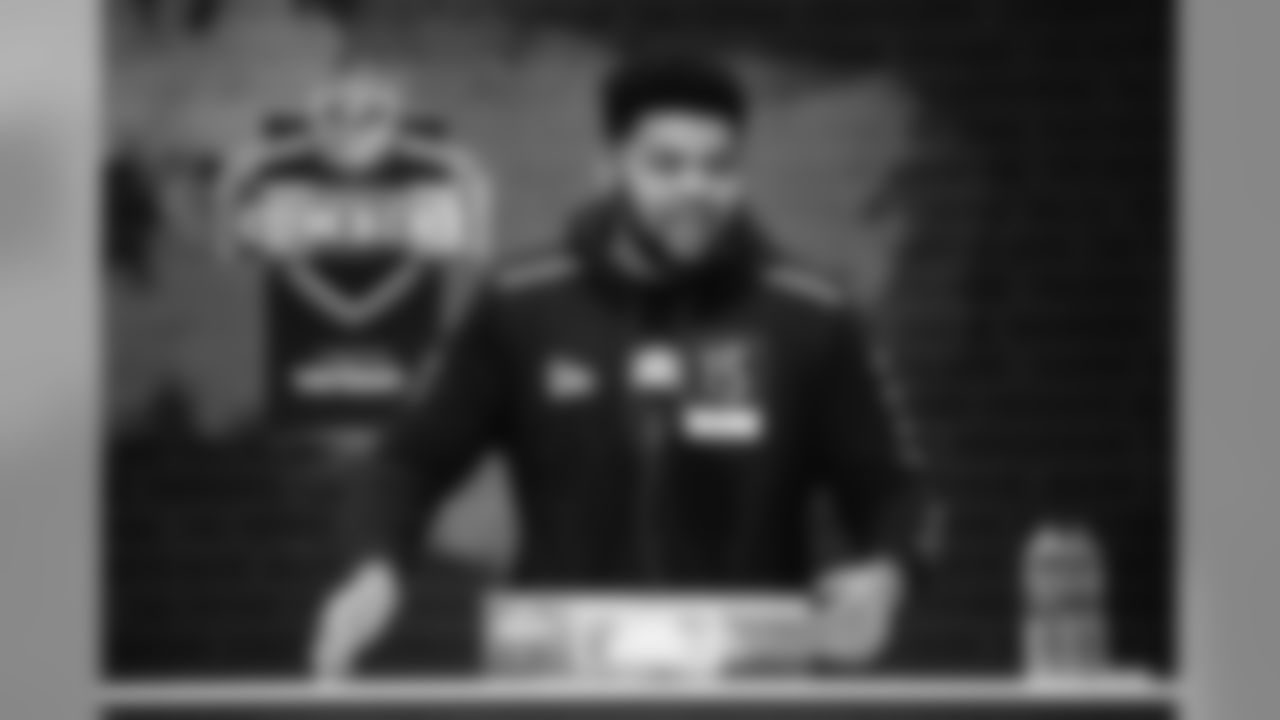

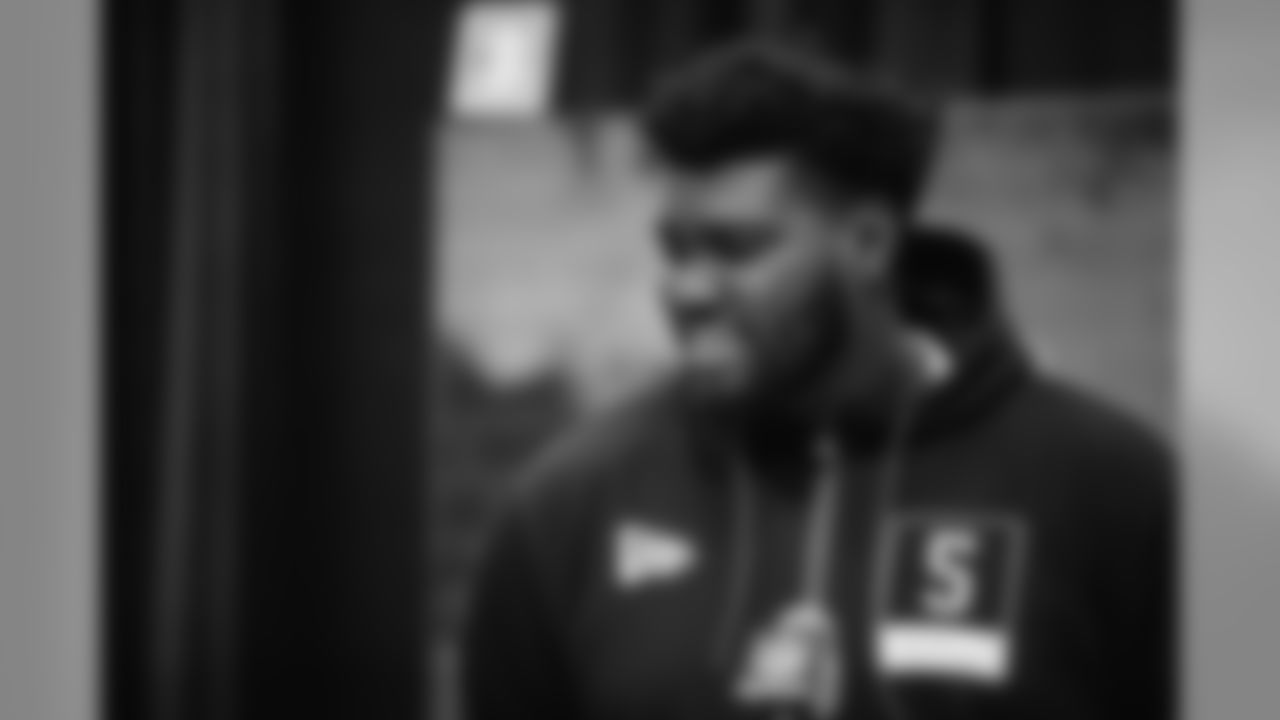
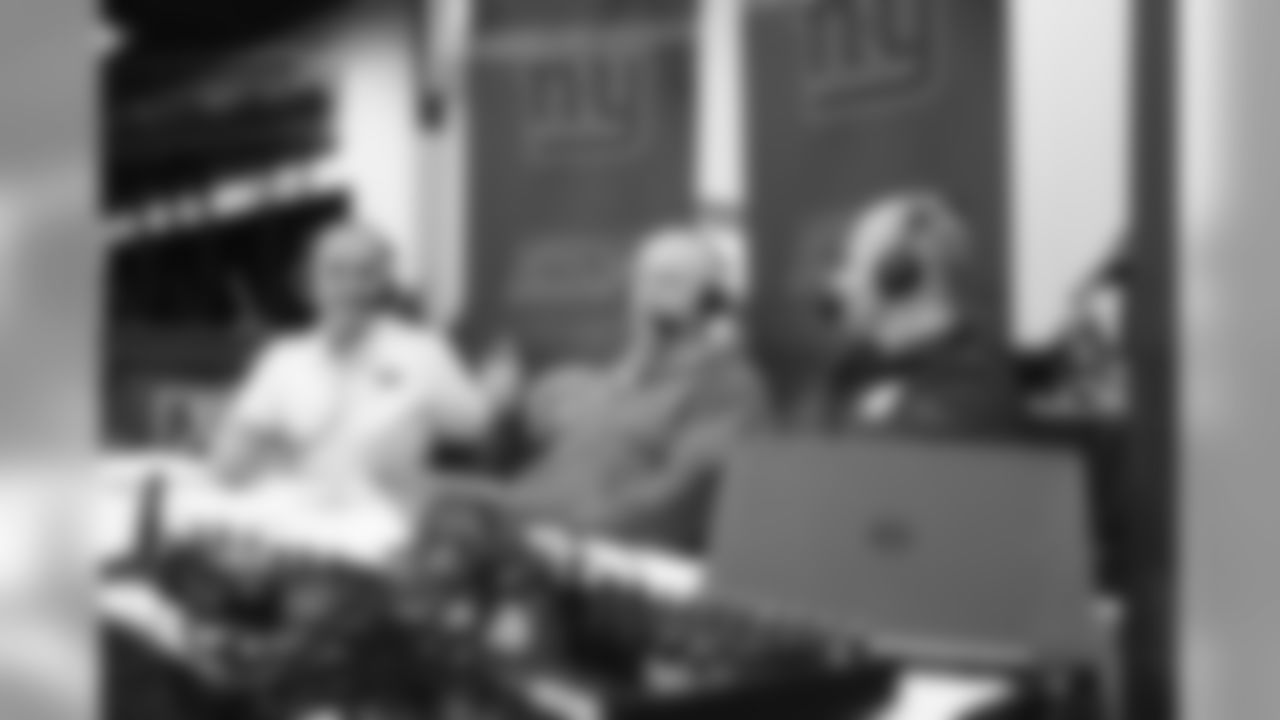



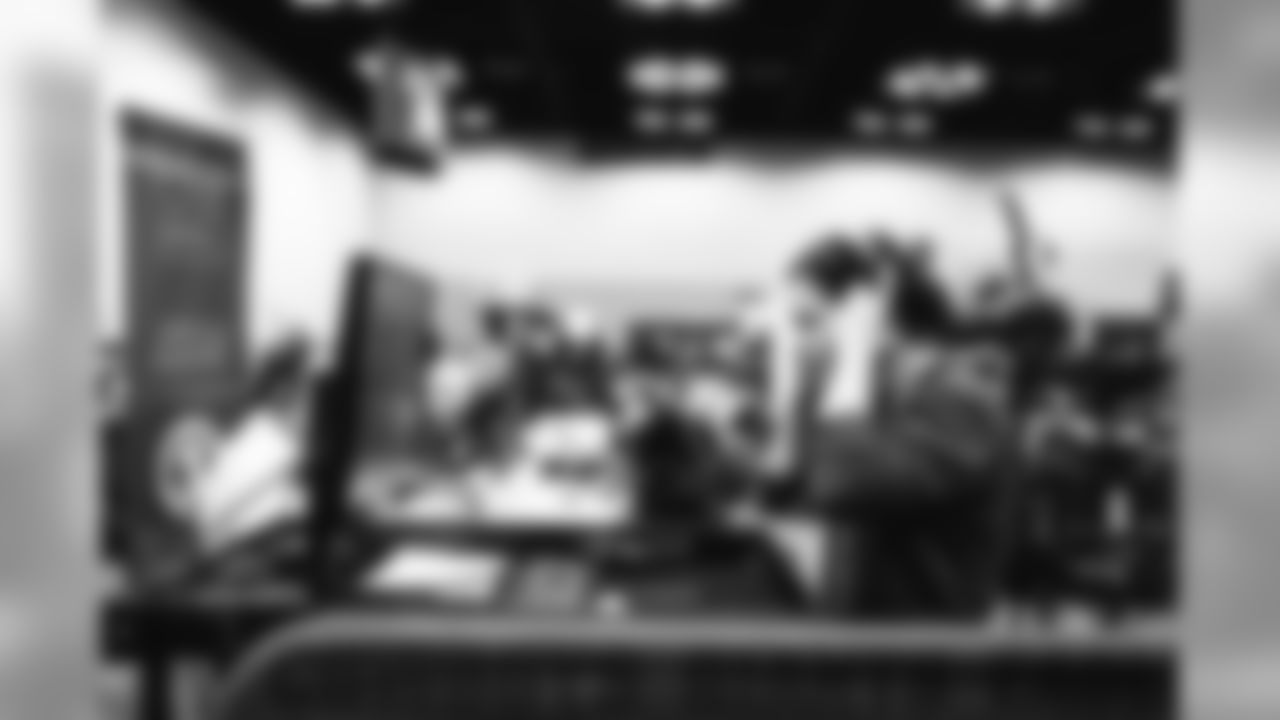
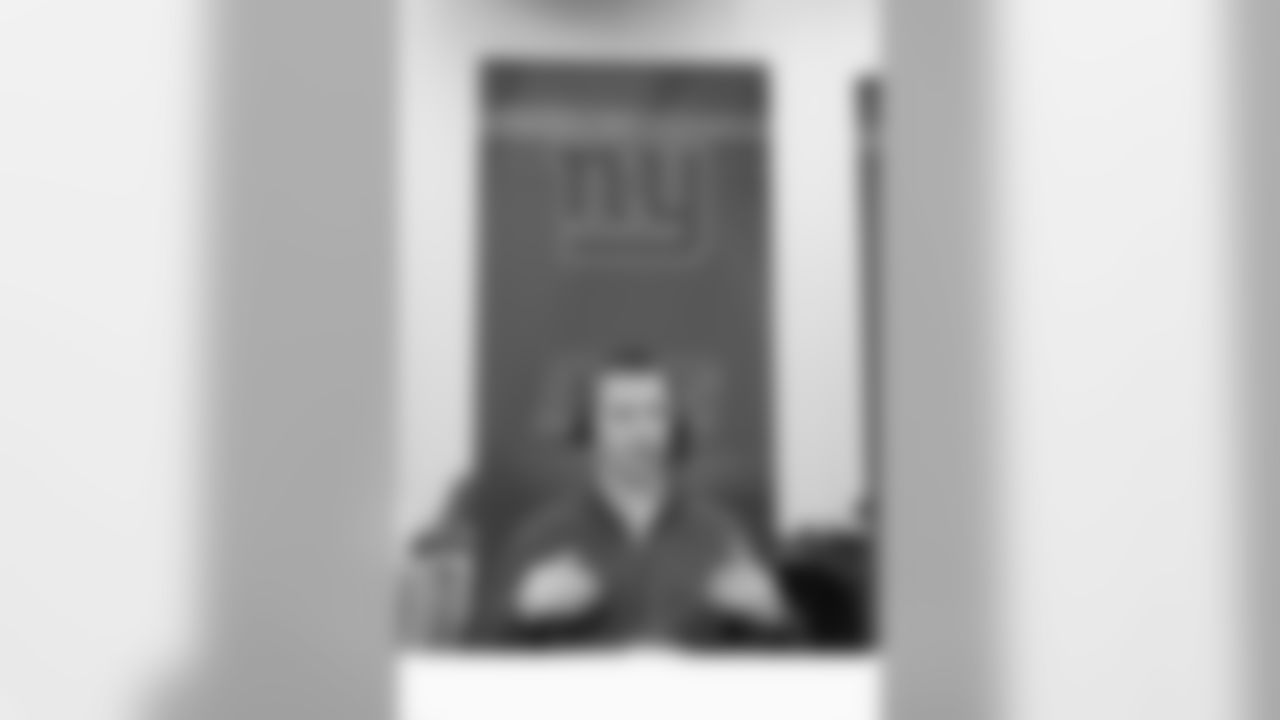
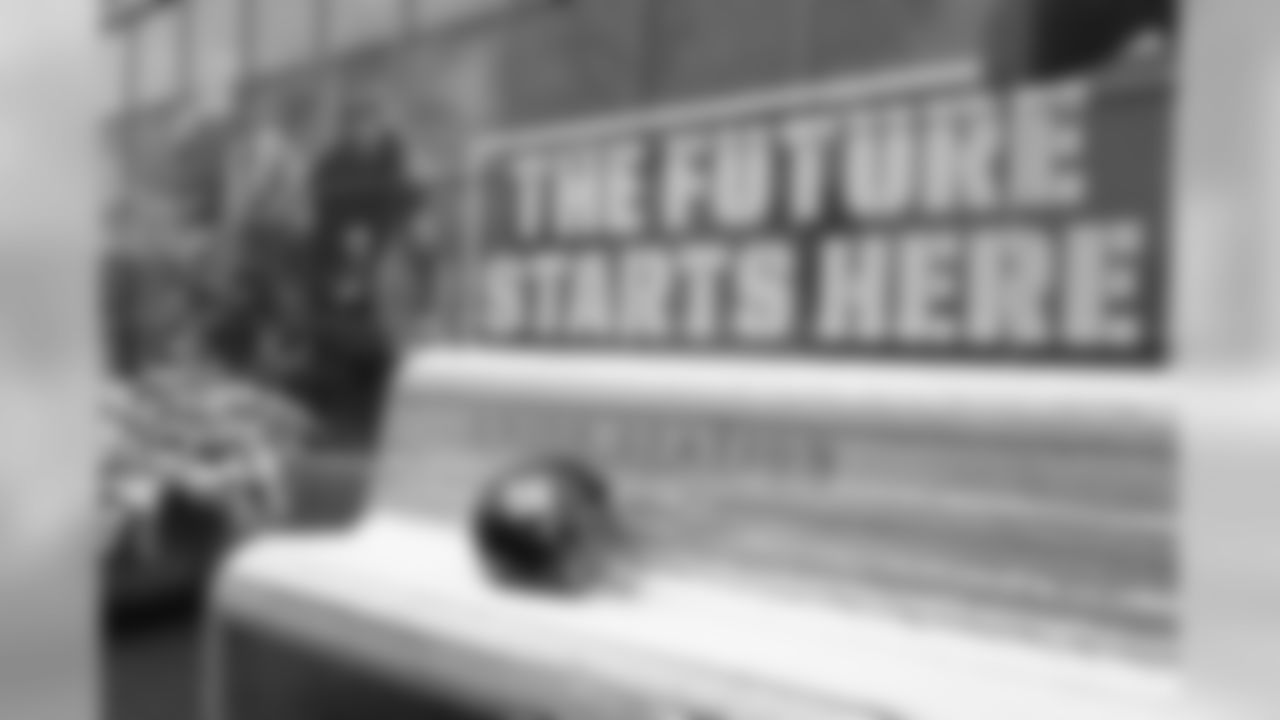
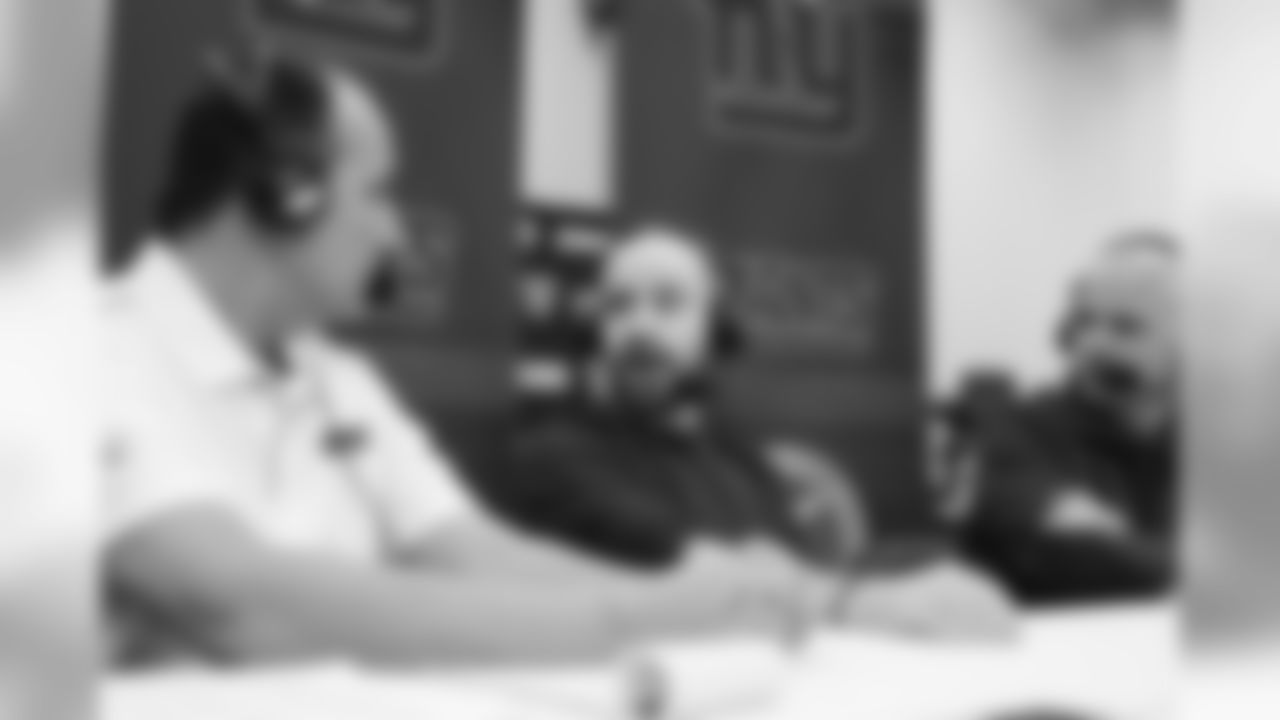



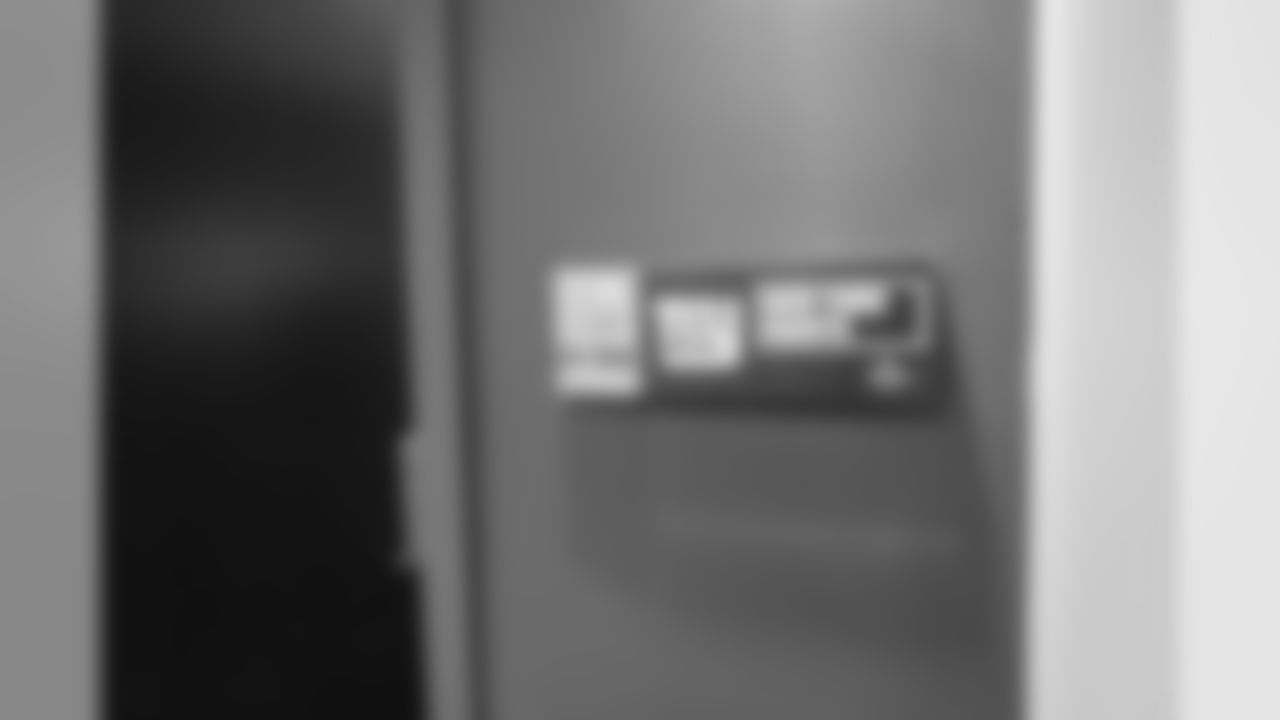




The Interview
Chad Klunder, the Giants' scouting coordinator, was tasked with bringing each prospect into the room, and often announced his name for all to hear, commencing an outbreak of handshakes before everyone gets down to business. If he was outside of the room, Klunder appeared as soon as the two-minute warning sounded. Almost every player goes directly to visit another team and keeping one past your allotted time is akin to unsportsmanlike conduct.
There are specific questions and issues for each position group, of course, but the Giants' Combine player interviews follow a similar script.
A typical exchange between Colombo and a lineman began with the coach asking, "what do you call this front?"
"A bear front," the player replied.
"Why?"
"Both guards are covered."
Colombo also asked, "what do you guys major in more, outside zone or inside zone?"
"I think we were pretty even," the player said.
"Did you run a lot of slide or man protection?"
"Slide."
The coaches often offer advice or constructive criticism. Bret Bielema, the outside linebackers coach and senior defensive special assistant, told a player, "I like you. You're a good player. You're slippery."
After watching a tight end make a good release off the line, run a precise route and catch a pass, coach Freddie Kitchens asked, "If you could change anything about that play, what would you change?" The answer – "ball security."
Looking at the television, Colombo told one player, "You know what I like about that play? You're going right through that guy and being violent. If you are an offensive lineman, you have to be violent. You have to be consistent."
Tolbert told one receiver, "I like the way you finish runs after the catch," and another, "I like the way you put your foot in the ground and change direction." When a wideout missed a block on tape, Tolbert told him, "You need to take pride in that – the running backs are blocking when you're scoring touchdowns."
When asked questions, the players respond with as many "Yes sirs" as a platoon of Army privates. Are you comfortable lining up all over the place? "Yes sir." On this play, are you responsible for blocking (number) 94? "Yes sir." Colombo told one lineman, "I like watching you play. You knock the (crap) out of people." The response? "Yes sir." Do you play with a chip on your shoulder? "Yes sir."

Gettleman often watches a player's facial expressions when he is being challenged by a position coach.
"Does he shrink from it, because at the end of the day, he's going to be playing in front of 75,000 people," Gettleman said. "A lot of them have done that already, so that piece of it is not going to be a new event. But what they're going to be doing is playing in front of 75,000 people against much better competition than they've ever faced. It's like I tell people, the other guy gets paid to play, too."
While the position coach/player exchanges occur, Judge, the coordinator and several others in the room take notes. Some will fire questions at the player at the front of the room, asking them about playing at a higher level of competition, the speed or pace of the game and the importance of increasing their strength.
"What you're looking for is for them to have an awareness of what they're walking into it," Gettleman said. "The answer that scares you is when he says, 'I'm not worried, I'll be fine.' They don't know what they don't know. It's just the way it is. The other thing you're looking for, is the kid self-aware? Does he really, truly understand what he's walking into, because it's a very different world. I don't care what level of football they've played on the college level. We play a different game. We play a different game that's faster and more violent."
Players might also get queried on how much they love playing football. But even a player who concedes he might be slightly less enthusiastic than some of his teammates – as at least one did - can score some points with the inquisitors in the room.
"I think he's being honest," Gettleman said. "I think he's being real. The kid you mentioned, he's at a Power 5 school that year in and year out is in the Top 10, so he's being honest. It's kind of interesting. Last year, we talked to an Alabama kid who didn't start until his third year. I asked him about it, he said, 'I had to wait my turn, there were a lot of great players.' It can be a little bit refreshing when a guy is humble."
"I love the honesty about it, because the player is self-aware enough to know, 'Hey, we know you're not,'" Pettit said. "I'd give more of a red flag if there's a guy that, whatever, maybe had some off-field issues or maybe he missed some time due to suspension that isn't that guy, and he's saying he's one. To me, that's more of a red flag than a guy being honest."
The pre-draft process is all about finding out as much information as possible on every eligible player.
"I think it's more investigating into why they do or don't have a level of love for the game," Judge said. "I'd say with all players, if they don't love football, it's very hard to be successful. As a profession, the NFL brings a lot to a lot of people. But it's a hard job. It's a very physically demanding job, it's a very stressful job. If you don't truly love football, all the perks that it brings with it will be pushed by the wayside with the daily grind. You have to truly love to play football. It's the whole, 'If you can do anything with the rest of your life and not worry about being paid,' you'd have to choose football to really want to be a good professional football player."
The Giants will continue their exhaustive search for those players until the first round of the draft on April 23 – and beyond.

Giants App
Download the Giants' official app for iPhone, iPad and Android devices







